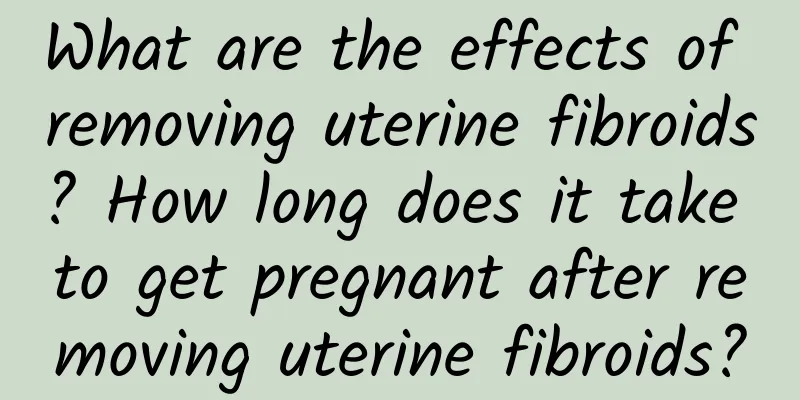What are the effects of removing uterine fibroids? How long does it take to get pregnant after removing uterine fibroids?

|
What are the effects of removing uterine fibroids? Uterine fibroids are a common gynecological tumor, and their presence can cause a series of discomfort and symptoms to women. When uterine fibroids seriously affect women's quality of life and health, doctors generally recommend that patients undergo surgery to remove the uterine fibroids. So, what effects will the removal of uterine fibroids have on women's bodies and fertility? First of all, removing uterine fibroids has a positive impact on women's bodies. Uterine fibroids often cause symptoms such as menorrhagia, pain, and abdominal pressure. In severe cases, they may also cause anemia, frequent urination, and other problems. Surgical removal of uterine fibroids can effectively reduce or even eliminate these discomforts and symptoms, and improve women's quality of life. Secondly, the removal of uterine fibroids will also have a certain impact on women's fertility. The presence of uterine fibroids will affect the size and shape of the uterus, which may hinder the implantation and development of the embryo. Although the removal of uterine fibroids can eliminate this problem, the damage to the uterus caused by the operation itself will also have a certain impact on women's fertility. Specifically, after surgical removal of uterine fibroids, women may need some time to recover, and it may affect their ability to conceive naturally in the future. However, removing uterine fibroids does not mean that a woman has completely lost the possibility of getting pregnant. In fact, many women successfully become pregnant and have children after surgery. This is because the removal of uterine fibroids can eliminate obstacles that affect embryo implantation and development, improving a woman's chances of conceiving. Although surgery may cause some damage to the uterus, in most cases, a woman's body will recover quickly and return to a state where she can get pregnant normally. In general, although the removal of uterine fibroids will have certain effects on women's bodies and fertility, these effects are controllable and reversible. Surgery can effectively relieve the discomfort caused by uterine fibroids and improve women's quality of life. Although surgery may have a temporary impact on women's fertility, most women can still successfully become pregnant and give birth smoothly after proper recovery. Therefore, the removal of uterine fibroids is an effective treatment method that can help patients recover their health and realize their desire to have children. I hope that this article will increase everyone's understanding of uterine fibroid removal and help women in need make the right decision. If you have symptoms of uterine fibroids, it is recommended to seek medical attention in a timely manner and receive professional medical guidance and treatment. Remember, health is the most important thing! |
>>: What color is uterine fibroid bleeding? Is uterine fibroid bleeding malignant or benign?
Recommend
What are the serious symptoms of vulvar leukoplakia?
What are the serious symptoms of vulvar leukoplak...
Gastric reduction surgery reduces hunger and Baiyun loses 23 kg
A "super obese person" weighing 300 kil...
What are the main causes of pelvic inflammatory disease
The main cause of pelvic inflammatory disease is ...
Female friends should do a good job in preventing cervical hypertrophy
When female friends suffer from cervical hypertro...
Does dysmenorrhea caused by cold body affect pregnancy? What other dangers does dysmenorrhea caused by cold body have?
Dysmenorrhea caused by cold body actually has man...
Calorie comparison of 8 types of rice dumplings: lotus leaf rice dumpling wins the kilocalorie ranking
When the Dragon Boat Festival arrives, there are ...
What are the early symptoms of habitual miscarriage? How can pregnant women prevent it?
After habitual miscarriage, patients are prone to...
Will Bartholinitis affect life expectancy?
Bartholinitis is a problem that many women have e...
What causes vaginal itching?
Excessive vaginal discharge and vulvar itching ar...
Go for the flakes! Excessive weight loss in adolescents affects development
"Inner beauty is more important than outer b...
What ointment is good for vulvar leukoplakia
What is the best ointment for vulvar leukoplakia?...
Eating at home has increased after the epidemic! More than 70% of Taiwanese people eat seafood at least once a week, ranking third in Asia
After the epidemic, people whose lives are gradua...
Crazy leg lifting or edema? Because you are still missing these 3 foods
Office workers are glued to their chairs all day ...
What are the 4 signs of uterine fibroids? The most obvious symptoms of uterine fibroids
What are the 4 signs of uterine fibroids? The mos...
Introduction to several typical symptoms of ectopic pregnancy
Ectopic pregnancy is a gynecological disease that...









